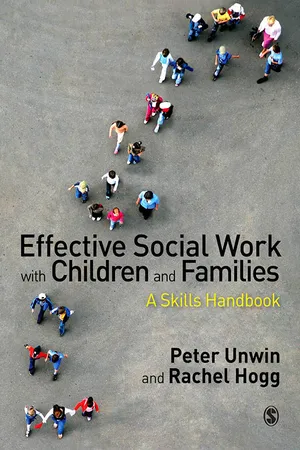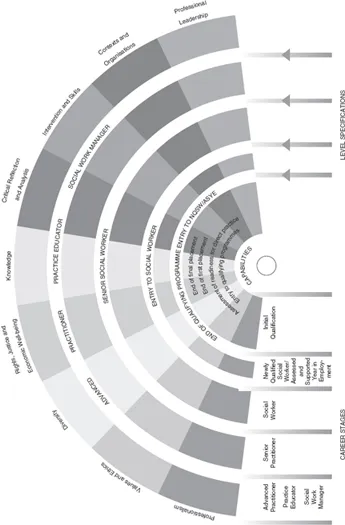
Effective Social Work with Children and Families
A Skills Handbook
- 224 pages
- English
- ePUB (mobile friendly)
- Available on iOS & Android
About this book
Written at a time when Social Work Reform Board and the Munro Enquiry are charged with looking at issues of effectiveness within children and families social work, the book tackles the different challenges that students and practitioners can be faced with, outlining common pitfalls and how to avoid these.
Key topics covered include:
- Legislation and policy
- Child development
- Safeguarding and child protection
- Assessment
- Communication
- Looking after yourself
Reflective questions are used throughout the book, ensuring that students critically evaluate their own practice. Case examples and case studies drawn from the authors? recent practice are included throughout the book to illuminate the realities of contemporary social work with children and families.
This text will be essential reading for undergraduate and postgraduate students, particularly as they prepare to go on placement. It will also provide valuable reading for qualified social workers who are interested in fresh and effective approaches to practice.
Frequently asked questions
- Essential is ideal for learners and professionals who enjoy exploring a wide range of subjects. Access the Essential Library with 800,000+ trusted titles and best-sellers across business, personal growth, and the humanities. Includes unlimited reading time and Standard Read Aloud voice.
- Complete: Perfect for advanced learners and researchers needing full, unrestricted access. Unlock 1.4M+ books across hundreds of subjects, including academic and specialized titles. The Complete Plan also includes advanced features like Premium Read Aloud and Research Assistant.
Please note we cannot support devices running on iOS 13 and Android 7 or earlier. Learn more about using the app.
Information
1 | WHAT DO SOCIAL WORKERS DO? |
Key Points of Chapter
- You can thrive rather than just survive as a social worker
- Social work is kinetic and volatile – it will never stand still
- Social work is a contested moral and political activity
- Social work is not a ‘win–win’ occupation
- Social workers need a strong knowledge base
- Social work offers a range of opportunities and different ways of working
- Social workers need a work–life balance
Proposed Professional Capabilities Framework areas covered in this chapter
- Professionalism
- Values and Ethics
- Critical Reflection and Analysis
- Contexts and Organisations
Draft Standards of Proficiency for Social Workers in England covered in this chapter
| 2 | Be able to practise within the legal and ethical boundaries of their profession |
| 3 | Be able to maintain fitness to practise |
| 10 | Be able to maintain records appropriately |
| 11 | Be able to reflect on and review practice |
INTRODUCTION


Reflective point
A QUESTION OF BALANCE
THE SOCIAL WORK REFORM BOARD (2010) AND THE MUNRO REPORT (DfE, 2011b)
- Calibre of entrants: that criteria governing the calibre of entrants to social work education and training be strengthened.
- Curriculum and delivery: an overhaul of the content and delivery of social work degree courses.
- Practice placements: that new arrangements be put in place to provide sufficient high quality practice placements, which are properly supervised and assessed, for all social work students.
- Assessed Year in Employment (AYSE): the creation of an assessed and supported year in employment as the final stage in becoming a social worker.
- Regulation of social work education: more transparent and effective regulation of social work education to give greater assurance of consistency and quality.
- Standard for employers: the development of a clear national standard for the support social workers should expect from their employers in order to do their jobs effectively.
- Supervision: the new standard for employers should be supported by clear national requirements for the supervision of social workers.
- Frontline management: the creation of dedicated programmes of training and support for frontline social work managers.
- Continuing professional development: the creation of a more coherent and effective national framework for the continuing professional development of social workers, along with mechanisms to encourage a shift in culture which raises expectations of an entitlement to ongoing learning and development.
- National career structure: the creation of a single, nationally recognised career structure for social work.
- National College of Social Work: the creation of an independent national college of social work, developed and led by social workers.
- Public understanding: a new programme of action on public understanding of social work.
- Licence to practise: the development of a licence to practise system for social workers.
- Social worker supply: a new system for forecasting levels of supply and demand for social workers.
- National reform programme: the creation of a single national reform programme for social work.

- The Government should remove the specific statutory requirement on local authorities for completing assessments within often artificial set timescales, so that professionals can give equal weight to helping children, young people and families, as well as assessing their problems.
- Local services that work with children and families should be freed from unhelpful government targets, national IT systems and nationally prescribed ways of working. They should be free to re-design services that are informed by research and feedback from children and families, and that pay more attention to the impact on children’s safety and welfare.
- A change of approach to Serious Case Reviews (SCRs), learning from the approach taken in sectors such as aviation and health care. There should be a stronger focus on understanding the underlying issues that made professionals behave the way they did and what prevented them from being able properly to help and protect children. The current system is too focused on what happened, not ...
Table of contents
- Cover Page
- Title
- Copyright
- Contents
- Introduction
- 1 What do Social Workers do?
- 2 Social Work Theories, Values and Methods: Where Does Your Practice Fit?
- 3 Legislation and Policy: What You Need to Have at Your Fingertips to be Effective
- 4 Child Development: The Importance of Having a Sound Understanding about Life Stages in Children
- 5 Communication: How to Improve Your Skills
- 6 Assessment: Your Role in this Complex Dynamic
- 7 Safeguarding, Child Protection and Your Chance to Make a Difference
- 8 Analysis: Critical Skills for Effectiveness
- 9 Effective Planning
- 10 Recording: Purpose, Importance, Techniques
- 11 Working In and Around the Organisation
- 12 Looking After Yourself
- Conclusion
- Appendices
- Glossary
- References
- Index